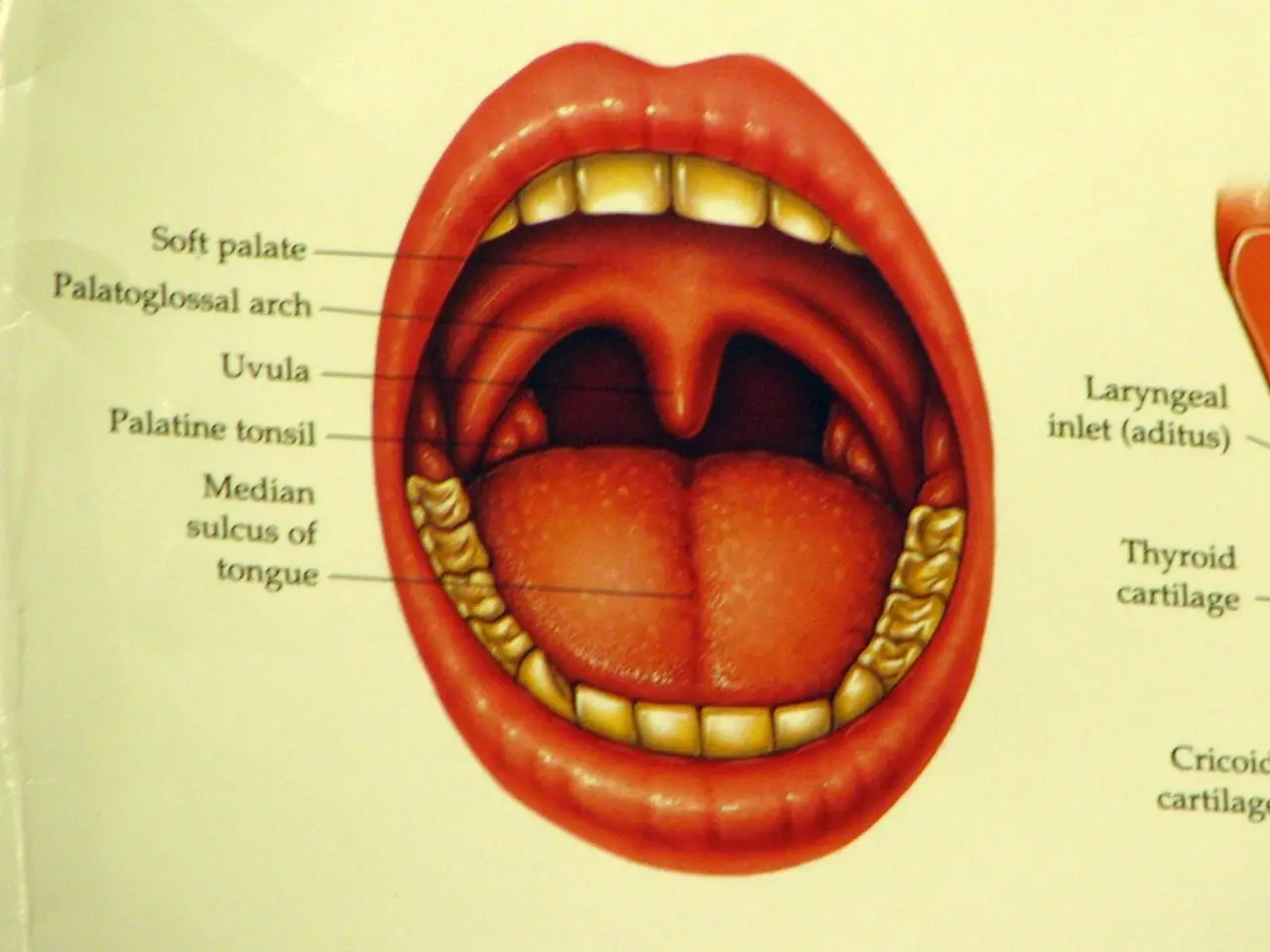Tongue with Wavy Edges: Causes, Signs, and Remedies
In the realm of oral health, a condition known as scalloped tongue, or crenated tongue, has gained attention. This article aims to shed light on this condition, its associated symptoms, and potential treatment options.
To diagnose scalloped tongue, doctors first rule out other potential conditions and delve into a patient's symptoms and medical history. The most noticeable sign of scalloped tongue is the tongue's indented, rippled, or scalloped edges, particularly on the outermost sides.
Several factors contribute to the development of scalloped tongue. Pressure from the tongue pressing against the teeth, often due to limited space in the mouth or an enlarged tongue (macroglossia), is a common cause. Vitamin deficiencies, especially B vitamins and iron, can also lead to scalloped tongue due to inflammation.
Sleep disorders such as obstructive sleep apnea (OSA) and systemic or neurological conditions, like bruxism (teeth grinding), increase pressure on the tongue margins and are linked to tongue scalloping. Malabsorption or digestive issues, as suggested by Ayurveda, may indicate nutritional deficiencies or stagnation in the digestive system and contribute to scalloped tongue.
In addition to these causes, inflammatory and infiltrative conditions associated with scalloped tongue include Down syndrome, lipoid proteinosis, hypothyroidism, sarcoidosis, amyloidosis, angioedema, tuberculosis, multiple myeloma, neurofibromatosis, and more.
Associated symptoms of scalloped tongue include visible indentations or ridges along the sides of the tongue, swelling or enlargement of the tongue (macroglossia), dry mouth or irritation, and symptoms related to underlying causes, such as fatigue or anemia with vitamin deficiencies, or disrupted sleep in sleep apnea. In Ayurveda, scalloped tongues may be accompanied by a coated, rough, or swollen tongue and digestive symptoms like diarrhea or acne.
Addressing the underlying cause is key to treating scalloped tongue. For vitamin deficiencies, supplementation with Vitamin B12 or iron can help reduce tongue swelling and scalloping. In sleep apnea cases, treatments such as CPAP therapy or dental devices to improve airway obstruction may relieve tongue pressure and improve symptoms. Managing bruxism with mouth guards or stress reduction can also reduce tongue scalloping caused by teeth grinding.
Improving oral hygiene and hydration to reduce irritation and maintain tongue health is also crucial. According to Ayurveda, treatment may include customised digestive detox teas, herbal supplements, dietary changes to improve nutrient absorption, and lifestyle practices aimed at balancing digestive fire and lymphatic health.
If scalloped tongue is accompanied by pain, persistent swelling, or other concerning symptoms, consultation with a healthcare provider or dentist is recommended to rule out other pathologies. For severe cases caused by genetic, inflammatory, or infiltrative conditions, surgery may be necessary to restore the tongue's shape.
In summary, scalloped tongue commonly results from physical pressure, nutritional deficiencies, sleep apnea, or digestive issues, with treatments focusing on correcting the root problem and improving oral and systemic health.
- Recognizing scalloped tongue necessitates ruling out other medical-conditions, such as macular degeneration or bipolar disorder, in the examination of a patient's symptoms and history.
- Predictive analysis in healthcare may aid in diagnosing and understanding the complex interplay of factors leading to conditions like scalloped tongue, such as type 2 diabetes or eczema.
- Depression, HIV, and psoriasis are just a few medical-conditions unrelated to scalloped tongue, but the importance of addressing mental and physical health-and-wellness cannot be overlooked.
- Dry mouth, a symptom associated with scalloped tongue, might also be a sign of degeneration in the salivary glands, which could lead to further complications like dental caries.
- Preparing for a medical consultation involves researching potential questions and concerns, as well as familiarizing oneself with terms like AQ (Asthma Quality of Life Questionnaire) for a comprehensive understanding of health matters.
- Science continually advances our understanding of medical-conditions and their interplay with other aspects of our well-being, such as the relationship between scalloped tongue and dry eye syndrome.
- In Ayurvedic medicine, diagnosing scalloped tongue often involves understanding associated conditions like dry skin or dry hair, which may indicate an imbalance in the regulation of fluids and nutrition within the body.
- When tackling medical-conditions like scalloped tongue, it's essential to be proactive in maintaining overall health-and-wellness, ensuring appointments for annual check-ups, and adopting healthy lifestyle practices for prevention and long-term management.




